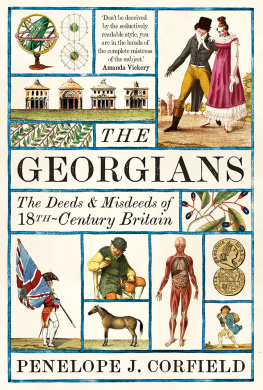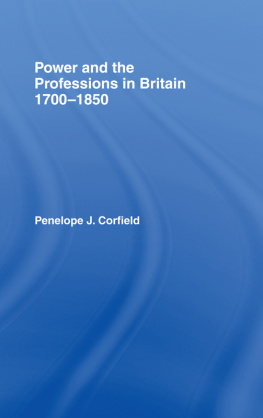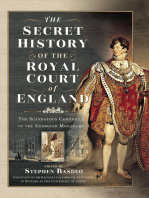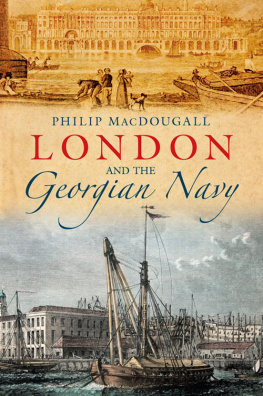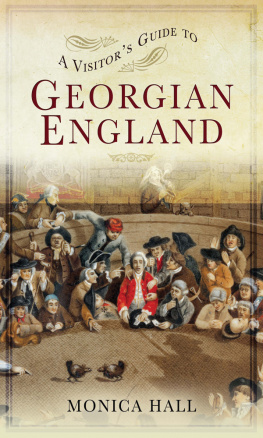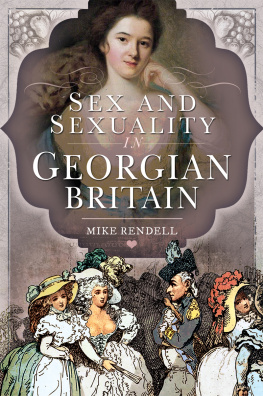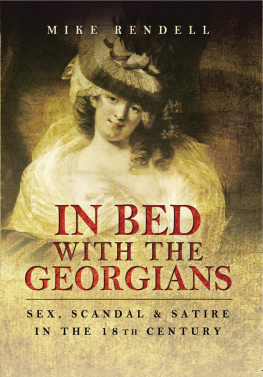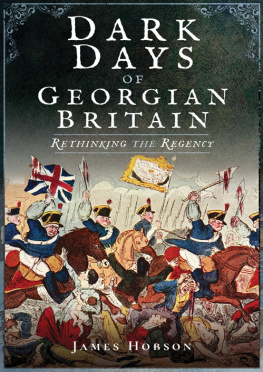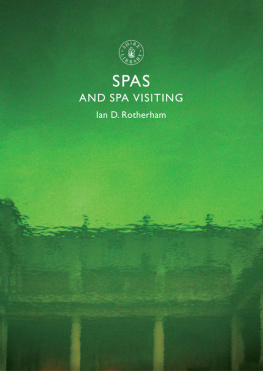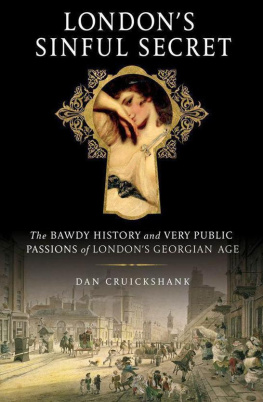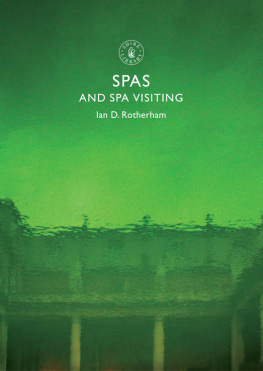THE GEORGIANS

Copyright 2022 Penelope J. Corfield
All rights reserved. This book may not be reproduced in whole or in part, in any form (beyond that copying permitted by Sections 107 and 108 of the U.S. Copyright Law and except by reviewers for the public press) without written permission from the publishers.
For information about this and other Yale University Press publications, please contact:
U.S. Office:
Europe Office:
Set in Adobe Caslon Pro by IDSUK (DataConnection) Ltd
Printed in Great Britain by TJ Books, Padstow, Cornwall
Library of Congress Control Number: 2021940107
e-ISBN 978-0-300-26506-4
A catalogue record for this book is available from the British Library.
10 9 8 7 6 5 4 3 2 1
CONTENTS
ILLUSTRATIONS
In text
Plates
PREFACE
T he eighteenth century is a period in British history which triggers strong responses both admiring and censorious. Its architecture remains generally celebrated, as does its taste in furniture and garden design. Novelists as well as film and TV directors enjoy the periods reputation for steamy sex lives and the fashion for heaving bosoms in low-cut dresses. The hugely successful Bridgerton series, on screen and page, is a recent case in point. In addition, swashbuckling naval adventures set in the days of Horatio Nelson are perennial favourites. And readers of all ages can enjoy Georgian literary classics, from Gullivers Travels to Pride and Prejudice. Together, the many key eighteenth-century legacies make a formidable list, including, not least, the successive Acts of Union which united the kingdoms of Great Britain and Ireland.
Yet the domestic political history of the era is often dismissed as parochial, and its industrial history as grimly utilitarian. One Victorian artist sweepingly claimed to find the entire period as boring as a wet Saturday afternoon. Meanwhile, there are big disputed issues which are not just matters of personal taste but are highly serious questions for society at large. The eighteenth centurys scientific techno-culture has become enshrined as the ancestral basis of todays high-tech world, yet the intensive burning of fossil fuels inadvertently launched a process of global warming which is now generating total environmental crisis. Too much cultural optimism can lead to over-confidence, today as yesterday.
At the same time, moreover, eighteenth-century Britains imperial expansion and its central participation in the international trade in enslaved Africans are developments that are nowadays viewed, at least by the huge majority of good-hearted people, as definitively on the wrong side of history. The current disputes over public statues honouring eighteenth-century dignitaries whose reputations are compromised in the eyes of posterity make that point abundantly clear.
These complex links across time, complete with changing attitudes. are fundamental to the story of the Georgians deeds and misdeeds. This book looks again at the direct evidence from the era, investigating individual lives and testimonies, and bypassing later myths and legends. In parallel, however, since the reputation of an epoch is also part of its long-term history, this book reconsiders how the actions and inactions of eighteenth-century Britain have been regarded by later generations. In that spirit, each chapter ends with a short coda entitled Time-Shift: Then and Now. These offer brief interludes, with evidence for through-time contemplation, exploring how people today adopt, adapt, remember, forget, praise and blame the compound Georgian heritage. Further resources and links to special interest groups are also shared in website thegeorgiansdeedsandmisdeeds.com.
Of course, all these retrospective assessments raise central questions about which criteria of judgement can be validly adopted when judging the past. These major themes are debated throughout.
My personal interest in eighteenth-century life is long-standing. During my schooldays and undergraduate studies, however, this period of British history was skated through very rapidly. My move into the eighteenth century, as a postgraduate at the London School of Economics in the later 1960s, was thus a cheerful step into the unknown. The congenial company of other scholars on the same adventure was a great bonus, as was the abundance of accessible but under-studied sources. It is a particular pleasure to acknowledge my intellectual debts both to the meta-critical intellect of F.J. (Jack) Fisher, and equally to the creative power of E.P. (Edward) Thompson, no mean critic himself. Without agreeing totally with either scholar, it was a complete education to spend time in debate with such high-powered and generous minds.
A further point to mention is that my personal cultural roots stem from a distinctly secularised form of Protestant Dissent particularly a secularised Quakerism. And its also relevant that my outlook is temperamentally optimistic, although without believing that history constitutes an unalloyed march of progress.
Given that this study has taken many years to complete, the roll-call of people who have helped is a lengthy one. The organisers and participants at London Universitys Long Eighteenth Century Seminar have delightfully informed, inspired, challenged, amused and sometimes even bored me into fresh thought. (I try to do the same in return.) Hearty thanks for shared intellectual camaraderie go also to all participants at the conferences of the British Society for Eighteenth-Century Studies (BSECS). And the same applies to the lively and ecumenical networks of the International Society for Eighteenth-Century Studies (ISECS/SIEDS). Invaluable support and stimulus have come too from colleagues and students at Royal Holloway, University of London; and from various institutions where I have held research fellowships, including Nuffield College, Oxford, All Souls College, Oxford, and Newcastle University.
Warm gratitude for sharing ideas and arguments goes also to: Junko Akamatsu, Lise Andries, Marc-Andr Bernier, Helen Berry, Margaret Bird, Jeremy Black, Gordon Bottomley, Ester Brot, Conrad Brunstrom, Michael Burden, Arthur Burns, Brycchan Carey, Philip Carter, Mary Clayton, David Clemis, Michle Cohen, Linda Colley, Joe Cozens, Sean Creighton, Adam Crymble, Stephen Boyd Davis, James Dixon, Jean-Franois Dunyach, Sutapa Dutta, Peter Earle, Chris Evans, Margot Finn, Edmund Green, Jeremy Gregory, Matthew Grenby, Leonie Hannan, Negley Harte, Charles Harvey, Karen Harvey, Farhat Hasan, David Hebb, Tony Henderson, Uriel Heyd, Tim Hitchcock, Stephen Hoare, Neil Howe, Eddie Hunt, Joanna Innes, Takashi Ito, Wen Jin, Serena Kelly, Mark Knights, Kazuhiko Kondo, Emi Konishi, Xabier Lamikiz, Sarah Lloyd, Matthew McCornack, Ichiro Michisige, Zeta Moore, Chris Mounsey, Takahashi Nakamura, Tadeshi Nakano, Desmond Newell, Frank OGorman, David Ormrod, Ivan Parvev, Julie Peakman, Nicola Phillips, Robert Poole, Steve Poole, Wilfrid Prest, Miranda Reading, Kate Retford, Giorgio Riello, Nicholas Rodger, Adrian Seville, Jill Shifrin, Akiko Shimbo, Heather Shore, Paul Slack, Carolyn Steedman, Anne Stott, Rosemary Sweet, Judith Thompson, Janice Turner, Tim Wales, Gina Luria Walker, John Walsh and Nuala Zahadieh.
Constructive criticism is always vital to bring a big project to completion. Cordial thanks are therefore due to: Peter Clark, Peter DSena, Beverley Duguid, Amanda Goodrich, Sally Holloway, Julian Hoppit, Liam Kennedy, Susan Whyman, Gillian Williamson and a set of rigorous anonymous readers.
Lastly, special thanks go to Amanda Vickery for her longtime exhortation to write this book; to Robert Baldock and Heather McCallum at Yale University Press for sage editorial advice; to my family for affectionate support, allied with quizzical scepticism; and, perennially, to my life partner and super-critic Tony Belton.
Next page
